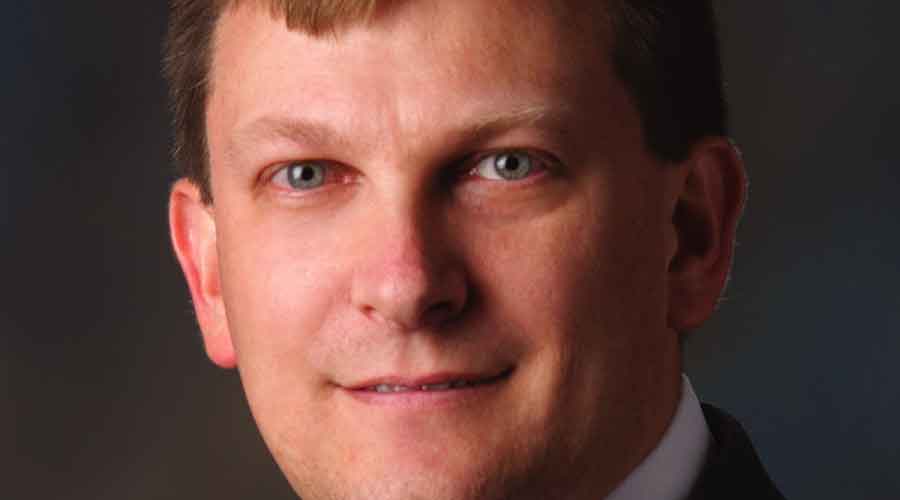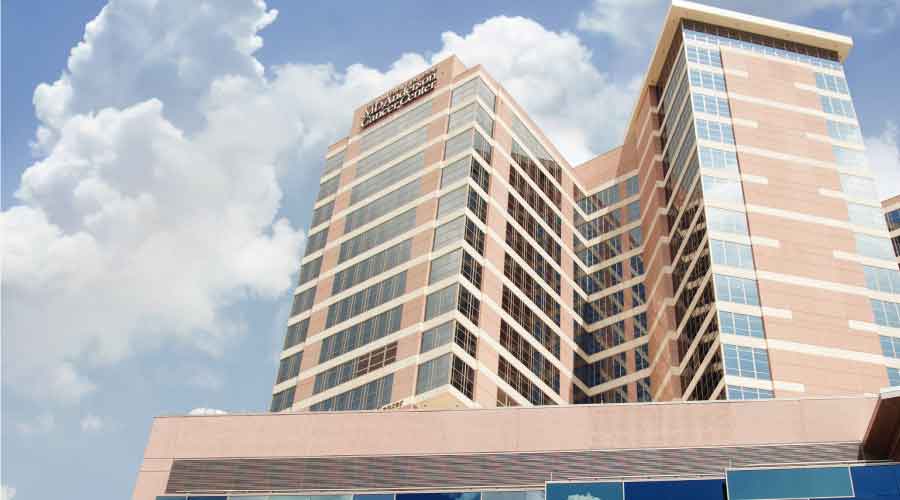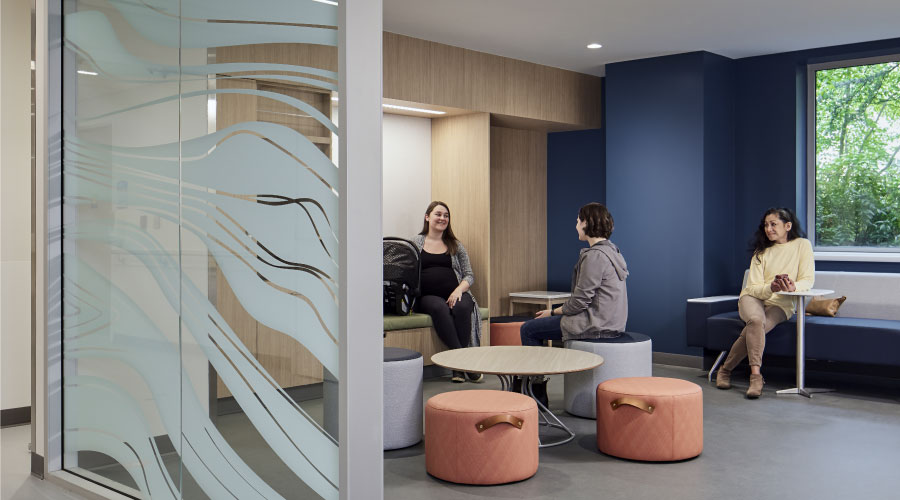 Courtesy MD Anderson Cancer Center
Courtesy MD Anderson Cancer CenterJames Storfer Embraces Facilities Management
James Storfer’s team strives to keep focus on recovery, not facilities, at Texas Medical Center
By Mackenna Moralez, Associate Editor
By now we all know the saying, “If you love what you do, you won’t have to work a day in your life.” It isn’t often that the phrase rings true to someone, but for James Storfer, Jr. it is something that he lives by.
For the last eight years Storfer has served as the director of operations and maintenance at Patient Care and Prevention Facilities at The University of Texas MD Anderson Care Center. The patient cancer and prevention facilities include approximately 6 million square feet at its main location in the Texas Medical Center and serves the surrounding Houston area. With such a large footprint, he has been able to work across several areas of patient care and property management within the facilities throughout his tenure.
“Facilities Management is a very rewarding career, especially in areas such as education and healthcare, where the benefits are altruistic and can affect society in positive ways,” Storfer says. “In any built environment, we want to ensure people can enter a space and focus on the reason they came instead of the environment.”
By shifting his focus onto the people who are using the facility, Storfer has been able to find more rewarding aspects to his career. He believes that the contributions that managers make to buildings help create a more positive atmosphere that allows patients to be more focused on recovering and employees to focus on their jobs.
“I see facilities management as a perfect environment for introverts, like me, that love to help people,” Storfer says. “I enjoy that my work has a big impact on improving the lives of patients and their families, enabling them to spend time together in a healthier state, without having the spotlight on myself.”
Remaining flexible
Maintaining buildings wasn’t Storfer’s original career plan, though. He began his career designing and building facilities before making the transition into facilities management. The move allowed him to grow his skillsets in a way that lends itself to a wider team approach.
“As an architect I enjoy all aspects of facilities, including how they work and how they affect people,” Storfer says. “In healthcare, the patient experience has a significant effect on their outcomes, and a well-run, well-maintained facility is an important component of that care. I think most would understand that facilities management is not a 9 to 5 job. Instead, it is essential to be available onsite and remain flexible when issues occur. Having that mindset is a must to be successful in this field.”

For Storfer, the day-to-day job calls for a constant awareness of potential challenges that threaten to overrun normal work with real and perceived emergencies. Healthcare facilities cannot close down, especially when there is an emergency event. Being flexible and staying up to date on the latest trends can come in handy when dealing with any issues that may arise throughout the day.
When the COVID-19 pandemic first began in 2020, Storfer and his team took a thoughtful approach to ensure that the Patient Care and Prevention Facilities could remain open while preventing the spread of the virus. By moving quickly and remaining flexible, they were able to implement several evidence-based actions, such as creating moats that allowed the team to care for patients who tested positive for COVID-19 while also protecting the rest of the staff.
“With the onset of COVID-19, we knew that cancer and the need for innovative care would not stop. MD Anderson remained committed to ensuring the safety of uniquely vulnerable patients, our workforce and our community,” he says. “We had challenges along the way and were required to change direction a few times as new information was released, but this taught us to be both more resilient and collaborative. Our approach worked out very well, and our staff were thankful for leadership understanding their concerns and working diligently to ensure their safety.”
Making changes
It hasn’t always been easy for Storfer. Early on in his career he had certain expectations of advancement within his workplace, but that never materialized despite giving his best every day. He learned quickly that not every company operates on the same philosophy he had.
Storfer explains that worked many long days without any change in compensation. Even though he had multiple conversations with leadership about potential growth, the available opportunities did not align with his future goals or current family needs. He credits having a mentor who helped challenge Storfer to see his own self-worth as a driving force in his career move. Because of the advice he received from his mentor, he was able to move to a company that better appreciated him, his skillsets and had an overall healthier workplace culture.
“I’ve learned the importance of this over the years, and I appreciate the ability to work at a company like MD Anderson with tremendous leaders who are committed to supporting their teams,” Storfer says. “For anyone making the choice to enter the [facilities] industry, my advice is the same as I would give for entering any industry: Culture matters. Choose a company that has the right culture, and take seriously your role in maintaining that culture. Be accountable, seek feedback and be willing to adjust to serve your customers.”
It’s not only Storfer who felt like he has had to make changes throughout his career. During his time in facilities management, he has seen the industry evolve and rebrand itself. Technology has become more prevalent and managers are acting on calls to become more sustainable – which isn’t always the easiest task.
“I think society needs to understand and reward those that keep facilities operating in a more sustainable way,” Storfer says. “It is difficult to keep aged buildings functioning without funding for asset renewal/replacement as well as staff and continual learning. Efforts that bring more appreciation to our contributions to key infrastructure may help to stimulate increasing interest among future generations.”
In order to keep up to date, Storfer recommends that managers attend trade events, read whitepapers and participate in industry-related groups to help make educated choices for their facility. Being collaborative with colleagues and fellow industry members creates a healthy work environment. Success requires input and from people that want to take ownership and follow through. Having a diversity of thoughts allows for more solutions to be made.
“Success requires input and collaboration from people that want to take ownership and follow through,” Storfer says. “Not everyone is on the same knowledge journey, so you can’t assume everyone knows what you know — even even if they have been in their position a long time. I have been privileged to serve and lead many initiatives and teams throughout my career, with responsibilities ranging from revamping processes to restructuring operations. However, something that never gets old is when I, in concert with my team members, am able to bring teams into a culture where they are looking for opportunities to create more value.”
Preparing for the Future
Storfer continues looking for new challenges in his position. There is still so much more he is looking to accomplish.
Currently his institution is working to be recognized as a High-Reliability Organization in order to best work in complex and challenging environments without major failures or serious accidents. He says that there are several objectives in support for this, but a current priority is to upgrade to a new computerized maintenance management system. This will allow for improvement in processes with documentation, reporting and procurement.
Meanwhile, Storfer is also looking forward to the advancements that are being made in technology. He plans to strategically implement it and will train staff for any potential challenges that may rise while reassuring that these opportunities will make their work lives better.
“Patients heal. Students learn. Employees work. Customers consume. Facilities Management allows people to comfortably enjoy life,” Storfer says. “It is rewarding to know that I contribute to those things and create a positive and productive atmosphere.”
Mackenna Moralez is associate editor for the facilities market.
Related Topics:












